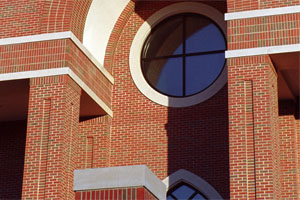Economics, Trends Fuel Fakery

Since the beginning of architectural time, there have been efforts by designers and builders to make one material mimic another. When the Egyptians began building with natural stone rather than papyrus, masons chiseled the stone facing to resemble bundles of reeds to ease the transition in the minds of the local people. By the Middle Ages, plaster was used to mimic stone, and in the mid-1800s Italians invented scagliola — gypsum mixed with glue — as imitation marble.
These days, in our discount-driven world, fake materials are propelled more by economics rather than any other reason; sadly, to the point where they're almost as prevalent in the construction industry as their real counterparts. From polyurethane siding formed to look like stacked stone and modern day's cast stone, to panel systems with embedded or locking thin "bricks" and artistic, interior paintings that resemble Old World brick walls, designers and builders push the envelope to give their clients the look of quality with a discount price tag.
Unfortunately, this philosophy has been taken a step further — twisted to a certain degree. Materials that mimic another material are no longer just replicas, but are actually assumed to have the same advantageous characteristics. Consumers truly begin to believe that the fakes are, for instance, just as strong and durable as the real thing. This paradigm shift has been devastating for the masonry industry, as well as for many others.
Even more devastating is when an end user purchases a fake product and assumes it carries the same safety benefits as the real thing. This month in Masonry, Mike Gilleran of McCausey Lumber Co. and Jared Kennison of Kennison Forest Products discuss the potential hazards of using uncertified scaffold planking that does not meet industry standards. Many contractors purchase these uncertified planks with the assumption that they are getting the same safety benefits; however, these imitations carry many risks, including the increased chance for injury and accidents.
Yet another form of fakery is the unscrupulous contractor with little integrity or expertise, undercutting experienced mason contractors and giving heartache to the entire industry. To combat this problem, MCAA is starting to integrate a multi-pronged approach to help increase members' position in the eyes of other construction professionals. This effort will include a stronger Masonry Showcase; the re-introduction of the Masonry Quality Institute; the rise of the MV-Tech online, continuing education portal; and the birth of a nationally recognized masonry industry certification.
For more information about any of these events or initiatives, or to increase your strength in the industry by becoming a member of the MCAA, please visit www.masoncontractors.org.
About the Author
Jennie Farnsworth is an Atlanta-based freelance writer and editor. She is a former editor of Masonry magazine.


















